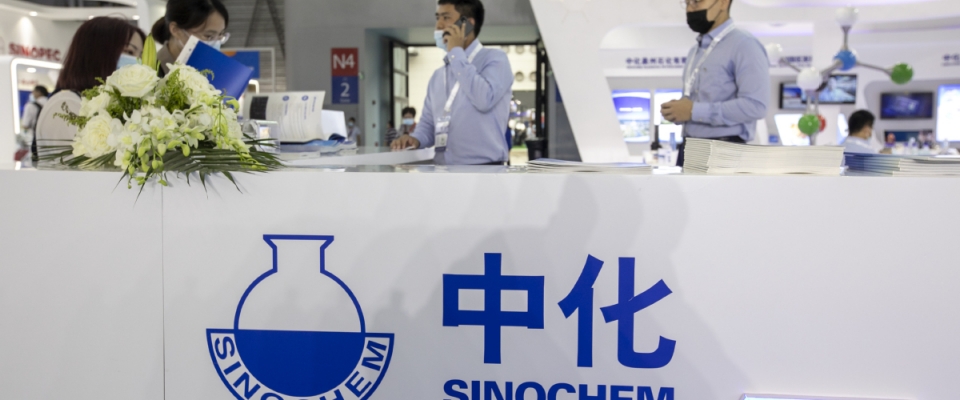China Approves Merger of Chemical Giants, Creating $150 Billion Company
China approved a merger between the country’s top two chemical companies, paving the way for another supersize state-run enterprise that Beijing hopes will become a dominant global player. The combination, which has been in the cards for years, would minimize competition between the two companies and create the world’s largest chemicals conglomerate with around 1 trillion yuan in annual revenue, equivalent to about $153 billion.
Restructuring of State firms will create world-class, competitive behemoth
China’s two centrally-administered, State-owned chemical manufacturers-Sinochem and ChemChina-are being restructured and merged to form a behemoth.
Industry observers said on Thursday they expect the merger to usher in high-quality development in the country’s chemical industry, in line with the larger national policy.
The State-owned Assets Supervision and Administration Commission, the country’s top State asset regulator, announced late on Wednesday that Sinochem Group Co Ltd and China National Chemical Corp Ltd, or ChemChina, will undertake a joint restructuring with the approval of the State Council, China’s Cabinet.
Both the companies are based in Beijing, with each holding several subsidiaries across industry segments.
Post-restructuring, the merged entity will have more than 200,000 employees and total assets valued at over 1 trillion yuan ($152.2 billion).
The new chemical giant will operate in a wide array of sectors like life sciences, material science, basic chemicals, environmental science, rubber and tires, machinery and equipment, and industrial finance.
Li Shousheng, chairman of the China Petroleum and Chemical Industrial Association in Beijing, said China currently lacks large-scale companies with international competitive advantages in petrochemicals. “So, the merger of the two Fortune Global 500 companies will create international competitiveness and accelerate the upgrading of the country’s petroleum and chemical industries,” Li said.
The constituent companies will be able to join forces to handle pressure and compete for new orders
Although the modalities and finer details of the merger are yet to be worked out, the two companies will ultimately help deepen SOE reforms and innovation, and seek new growth points as a bigger entity, said Xu Baoli, a researcher with the SASAC.
The merger will enable China’s chemical industry to better withstand and mitigate the impact from the continuing downturn in the global market, he said.
After the merger, the constituent companies will be able to join forces to handle pressure and compete for new orders.
Even though the government and the two chemical companies did not announce the group’s new name, the merged entity will own 17 domestically and globally listed companies, including Shanghai-headquartered Sinochem International Co, Pirelli, the Milan-based tire maker, and Adisseo, the French health product provider.
The world’s chemical industry is highly concentrated and dominated by large companies that boast global scale.
Global chemical giants have undergone consolidation to create large-scale chemical companies
Global chemical giants have undergone consolidation to create large-scale chemical companies in recent years.
Such consolidations have bolstered research and development activities in the industry, paving the way for product innovations.
For instance, Dow Chemical Co’s merger with DuPont Co and Bayer AG’s purchase of Monsanto Co in recent years have put an end to the competition among themselves for market share and financial resources, thus energizing R&D and innovation.
Wang Xiaoming, a researcher at the Institutes of Science and Development of the Beijing-based Chinese Academy of Sciences, said the merger is in line with the government’s efforts to ensure that SOEs can be reliable at critical moments and improve their risk prevention and risk management abilities, as well as further optimize State-owned assets and obviate avoidable competition.
The merged entity will have better industrial bases, R&D muscle in strategic emerging industries like new materials, life sciences and the digital economy.
It will play a greater role in supporting the smooth running of China’s supply and industrial chains in these fields, Wang said.
Any change in ownership of Syngenta would trigger a review by the panel, Cfius, people familiar with the matter previously told the Journal
Financial data for 2019 from market tracker Wind Info showed that ChemChina had total assets worth 843.96 billion yuan and operational revenue of 454.35 billion yuan.
With 2020 net profit of 15.1 billion yuan, Sinochem is a major operator in the oil and chemical industries, providing agricultural inputs like seeds, agrochemicals and fertilizers, and modern agricultural services, and exerting strong influence on city operations and the non-banking financial services sector.
ChemChina operates in six business sectors covering new chemical materials, specialty chemicals, agrochemicals, oil processing and refined products, tire and rubber products, chemical equipment, and product design. It has 148,000 employees, 87,000 of them working in overseas markets.Any change in ownership of Syngenta would trigger a review by the panel, Cfius, people familiar with the matter previously told the Journal. The panel has stepped up scrutiny of deals involving foreign investors in recent years amid heightened political concerns that China could acquire strategic U.S. technology through business acquisitions by Chinese companies.
About E. J. McKay
E.J.McKay is a Shanghai-headquartered investment bank with a special focus on mergers & acquisitions. We are one of the most long standing independent investment banks in China, with core business of mergers & acquisitions and financing advisory.


